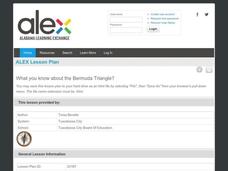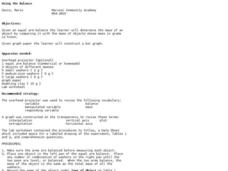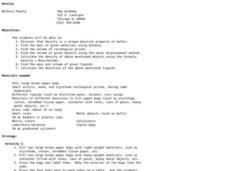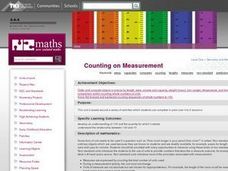Curated OER
Converting Units of Capacity, Weight, Mass, and Area
In this math worksheet, students solve the problems using measurement conversions. They concentrate on the units used for capacity, weight, mass, and area.
Alabama Learning Exchange
Straight Line Motion
Students examine gravity, mass, and friction. For this speed and motion instructional activity, students investigate how straight line motion is impacted by gravity, mass, and fiction as they participate in a hands-on activity.
Teach Engineering
Stormy Skies
Young meteorologists examine the four main types of weather fronts and how they appear on a weather map. Participants learn about the difference between the types of weather fronts along with their distinguishing features. A...
Curated OER
Scale Model of the Solar System
Young scientists gain a better understanding of space, the solar system and its vastness by creating a scale model. Students first need to calculate the distance between each of the nine planets according to the size of their scale. This...
Curated OER
Metric Meals
Sixth graders investigate metric measurements. In this metric measurement lesson, 6th graders explore mass, capacity, and length. Students examine graduated cylinders and balance scales to obtain measurements. Resources are provided.
Curated OER
What is SI?
In this SI units worksheet, students read about the System International of measurement and answer questions about given measurements. They indicate if given measurements are equal and they convert from one unit of measurement to another.
Curated OER
Time and Metric Measurements
For this comparing times and measurements worksheet, students read times in seconds, minutes, and hours and metric measurements of mass and length to compare groups of two and write the symbols for less than, equal to, or greater than....
Curated OER
How Can You Measure This?
Third graders work in small groups to complete a number of investigations in which they have to use measurement. They determine the fractional part of the newspaper that is used for news, sports, etc. They compare their height to their...
Virginia Department of Education
Mathematics Vocabulary Cards - Grade 2
Augment your math curriculum with posters detailing several concepts important to second grade math. Each poster features one math term from geometry, measurement, probability and statistics, computation and estimation, numbers and...
Lane Community College
Review Sheets: Introductory Physical Science
This hybrid worksheet connects mathematics to a science class. Learners practice solving problems that involve making a variety of conversions. An assortment of questions hits all the calculations needed for a middle school or beginning...
Statistics Education Web
Double Stuffed?
True or false — Double Stuf Oreos always contain twice as much cream as regular Oreos. Scholars first measure the masses of the filling in regular Oreos and Double Stuf Oreos to generate a class set of data. They use hypothesis testing...
Curated OER
Swinging Pendulum
Students engage in an activity which demonstrates how potential energy (PE) can be converted to kinetic energy (KE) and back again. Given a pendulum height, students calculate and predict how fast the pendulum will swing by understanding...
Corbett Maths
Density
A short video introduces the triangle that illustrates how to find any value given the other two in the density formula. Class members use the triangle to work several problems to find the mass, volume, or density of an object.
Alabama Learning Exchange
What You Know About the Bermuda Triangle?
Get lost in the classifications. Using the backdrop of the Bermuda Triangle, pupils classify it by angle and side measures. They also learn information about the triangle and its history.
Curated OER
Traveling Through the Solar System
Students use calculator and non-calculator methods for analyzing data. They apply data collection and analysis in a study of mass and weight. Students enhance and apply the concept of line of best fit. They master graphing in a plane,...
Curated OER
Momentum
In this momentum worksheet, students review the equations for finding momentum using the mass and speed. They solve eighteen problems using the equation for momentum to find the unknown.
Curated OER
Using the Balance
Students determine the mass of various objects. In this integrated math and science lesson, students use an arm balance to compare a known object to a combination of washers with a fixed weight. Students record data, construct a bar...
Math Mammoth
Metric Units Of Weight 3
In this metric units of weight learning exercise, learners review, study and discuss metric and customary units of mass. Students calculate the answers to forty two questions regarding different types of metric units of weight.
Curated OER
Density
In this density worksheet, students review the equation for density and are given a chart of the densities of various substances. They solve four problems finding the densities of substances and identifying unknown substances given the...
Curated OER
Density
Students find the mass, volume, and density of various objects. In this density measurement instructional activity, students observe how same-sized objects can have different masses, then use water displacement to find the density of...
Curated OER
Metric Units of Mass and Capacity
In this metric measure worksheet, learners solve 6 conversions, 3 comparisons and answer 5 questions about the best unit of measure for given items. Houghton Mifflin text is referenced.
Curated OER
Practice with Mass
Fourth graders investigate the weight/mass of a number of items using grams, and equivalents. They examine the use of a triple beam balance before massing objects including oil and water. They go over the weights they amassed and weigh...
Curated OER
Measuring and Comparing Weight and Capacity
First graders measure weight and capacity. In this measurement lesson, 1st graders explore visual examples of weight and capacity comparisons. Students also practice solving problems that their instructors model.
Curated OER
Counting on Measurement
First graders explore measurement. They measure by counting non-standard units. Students use a variety of non-standard units to predict and measure volume of various containers using rice.

























